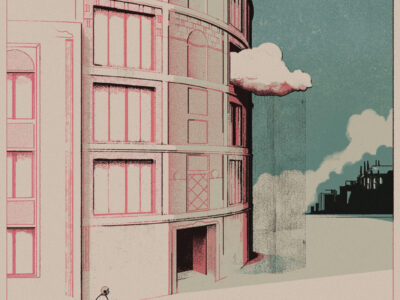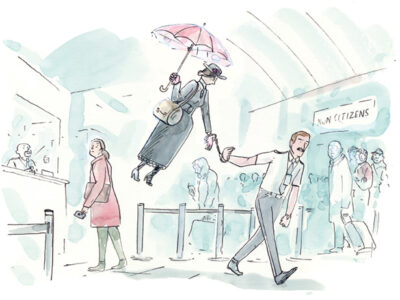
A dispatch from Asheville in the wake of Hurricane Helene.
By Dennis Drabelle
To paraphrase a lyric from the 1956 Broadway musical My Fair Lady: in Asheville, Weaverville, and Hendersonville, hurricanes hardly ever happen. Or so almost everyone living in and around those western North Carolina towns believed—not least my partner, Mike, and I. Weren’t we hundreds of miles inland from both the Gulf of Mexico and the Atlantic Ocean? And hadn’t we fetched Mike’s mother from a storm’s path in Savannah, Georgia, to shelter with us in Asheville a few years ago? Accordingly, on September 26 we and most other residents of the region ignored a county directive to evacuate the valleys of the Swannanoa and French Broad Rivers as Hurricane Helene bore down.
Mike and I did take precautions, though. Before going to bed that night, with rain falling and a forecast accumulation of inches in the double digits, we stockpiled jugs of water on a kitchen counter, filled up the bathtub with tap water, and did likewise with the sink in our garage. Candles, matches, and flashlights were at the ready. It was still raining when we woke up the next morning, but the power was on, our cell phones could send and receive messages, and the internet was accessible.
That proved to be the lull after the storm.
By 8 a.m. electricity was gone, our phones had quit working, we had no internet, and when we turned on our faucets, out came a sad drool. Yet we were among the lucky ones. Our house, which stands on fairly high ground in our neighborhood, Haw Creek, was undamaged. Scores of branches littered our yard, but the trees themselves were still upright. In our nine years of living in Asheville, the only outage to last more than a few hours had resulted from a 13-inch snowfall, so we expected normality to return within a day or two. Ten days later, our place is still without electricity or running water.
I repeat: we are lucky. As of this writing, the storm has taken more than 200 lives, and hundreds more of the living have been rescued from flooded areas. Asheville’s River Arts District has been wiped out, and our beloved Grail Moviehouse, which shows flicks that do not insult one’s intelligence, is gone. Officials at our arboretum estimate that 2,000 of its trees are down or damaged. And the Swannanoa River has become so acidic that anyone stepping into it with boots on will have them eaten right off their feet.
No, wait—that last item has been cited by Asheville city councilwoman Maggie Ullman as a prime example of the false rumors circulating to the detriment of regional recovery. Staying out of the Swannanoa is a good idea, but not because of illusory footwear-devouring pathogens in its water.
As disasters are wont to do, Helene has united its victims as never before. For an example, look no further than our horseshoe-shaped subdivision, Stonebridge. On that first day after, all of its residents were mired in ignorance. We had no sources of outside information—no TV or radio, no landline phones or cell service, no newspaper or mail. Then we remembered our car radios and turned them on, only to get little or no help there either. Not until the second day did we obtain reliable information as the city of Asheville teamed up with Blue Ridge Public Radio to air a daily briefing. And it took a while for even that to be useful. Early on, “assessing” was the operative word. Duke Energy was assessing how to get electricity flowing again. The city and county were assessing damage to the water system and roads blocked by downed trees. In truth, the powers that be didn’t know much more than we did, and, tiresome as the word might be, assessing was what had to be done.
Meanwhile, the food in our fridges would last awhile, and Mike and I have a gas stove in a neighborhood where electric ones are the norm. Lighting the burners with matches, we were able to cook or warm up simple meals—leftovers, canned goods, scrambled eggs. Other residents rolled out their portable stoves and grills and put on their aprons.
Bodily functions were another matter. Flushing the toilet had become a chore, and we abided by a saying I’d heard in California during periods of drought: “Pee Don’t. Poo Do.” Before taking care of the latter, we had to remove the tank’s top and fill it with water by hand.
The president of our homeowners’ association and his husband have a generator, from which they ran a line to a many-sided plug. Need to charge your laptop? Come on up. Your phone is dead? Bring it. Mark and George live on even higher ground than Mike and I do, and by the third day people were gathering in their driveway to make and receive phone calls. They also repurposed their swimming pool as a well from which anyone was free to haul away a bucketful of water suitable for anything but drinking.
For exercise, we walked round and round that horseshoe, socializing more than we do at our annual meetings or the occasional social held in the commons. That was how we got exciting drive-by news from a neighbor: he’d just come back from the nearest Home Depot, which was selling packs of drinkable bottled water. We drove there straightaway and joined the first line of many to come. Half an hour later, we each had our allotted 12-pack.
By the fourth day, our phones were working well enough to receive two offers from worried friends to host us at their homes. Still without running water and electricity, tired of having to go to bed every night at 7 p.m., even tired of reading, we accepted the offers seriatim, the first in Athens, Georgia, which we’d visited several times and know our way around, the second in Washington, DC, our hometown before we moved further south.
But with those possibilities came a new problem. Our car’s gas tank was about a quarter full, and Athens was a three-hour drive away. Only a handful of Asheville gas stations were open, and the wait for service was said to be two hours or more. We heard credible rumors that gas was readily available in towns an hour-and-a-half southward, but did we have enough fuel to reach them? We dithered until a friend with no intention of leaving gave us a pledge: “I have 300 miles worth of gas in my car, and if you run out on the highway, call me and I’ll come pick you up.” With that insurance policy, we packed up, got going, and made it to the appropriately named Travelers Rest, South Carolina, where we treated ourselves to the luxury of filling the tank.
After a week in Athens, we returned home to check on our house, pick up our mail, and repack for the DC trip. I set aside a couple of hours to drive downtown and confirm what I believed was the case. Despite rumors to the contrary, the stylish Art Deco heart of Asheville was intact, and although few businesses were open and car and foot traffic was sparse (the state’s governor, Roy Cooper, had warned tourists off until further notice), literal signs of volunteerism and creative cooperation were everywhere. A typical example: “FREE FOOD AT BOMBA, OCTOBER 6, 1 P.M. TILL SUPPLIES LAST. MUCH LOVE TO ALL.” Stacks of bottled water sat on street corners for the taking, and the Basilica of St. Lawrence was providing free laundry service in the church parking lot. Hazel Twenty Boutique, a women’s clothing store, had transformed itself into a distribution center for donated clothing. “We’ve received so much stuff that we’re only accepting winter garments now,” the owner, Lexi DiYeso, told me. “And we’ve outgrown this spot—we’ll be moving to a bigger one soon.” Asked when she thought her shop would reopen for business, she replied, “I have no idea.”
While driving back to Stonebridge, I heard a familiar voice on the radio. It was Jim McAllister, a friend from our book group, who after moving to the region dove into politics and got himself elected mayor of Woodfin, a small town adjacent to Asheville. “We’ll come back better than ever,” he cheer-led. That is not only what we all need to believe. It may also be true.
On a highway out of town later that afternoon, Mike and I noticed a mini-parade of bright yellow trucks going the other way, each with a cargo of 36-inch pipes. The spectacle was self-explanatory: water pipes to the rescue, the start of Asheville’s comeback.
Dennis Drabelle G’66 L’69 is a Gazette contributor and the author, most recently, of The Power of Scenery: Frederick Law Olmsted and the Origin of National Parks.




